The delay of our parcel—which remained in the tight-fisted grip of Kenya’s customs officials—unlocked an unexpected holiday in Jinja. With nothing to do but wait, and thanks to the immense generosity of Ed—the friend of an ex-colleague, whose office in Jinja doubles as a sanctuary for two-wheeled waifs and strays—we pressed pause on progress. This pause was welcome. A feeling had begun to surface in the group that our days had become rather too distance-focussed of late. Cast your minds back to a rainy winter in Northern Europe and you may recognise the sentiment. Much like Joe had voiced a desire for some Holiday Riding on our quest south through the Alps, Nadia had noticed that our waking hours in East Africa had become little more than a series of stints, and suggested that it might be nice, on occasion, to actually see some of the places we were tearing through.
Luckily, Jinja—an oasis, perched on Lake Victoria, that fits the bill for both recuperation and exploration—came to the rescue. During the days there, we each got stuck into our various methods of relaxation. Nadia explored the local markets and commissioned creative repairs of the kit that was damaged in her crash; Seamus cocooned himself with quality literature, and cradled ice-cold beers in front of the football; Tom got stuck into his German practice with ferocious determination; and I squabbled with the Ugandan hospitality staff—who, it seems, follow the party line on East African customer service. One particularly lively dispute saw me picking apart my meal and holding up its constituent parts in an attempt to convince the waiter—who’d opted for a stance of Trumpish denial—that the meal sat in front of me was completely different to the one I’d ordered. It’s hard not to admire the unbending stubbornness of the service industry out here. If it were a stick of rock, it’d have Tough Shit running through its core. It’s rather a good life lesson, once you move past the vexation to the farcical humour beyond.
By the weekend, we were all so relaxed we were practically floating. Well, not so much practically as literally. In Jinja, the verb to float takes on new meaning. Our hosts, Ed and Loren—both seasoned floaters—decided that Sunday would do nicely for our initiation. So, after a trip to the local off-license to pick up the necessary supplies, we found ourselves strung together in a line of inflated truck tires, bobbing down The Nile. The sun blazed, the music blared, and the extra tire—aptly named The Bar, which contained a coolbox of gin, tonic and ice—remained gratefully in reach. This was the epitome of relaxation. For most of us…
Seamus—now designated Wildlife Worrier after the hippo incident—soon became concerned about an altogether smaller river-dweller than the one that had first secured him the title. And, surprisingly, it wasn’t the two-metre-long monitor lizard we spotted lumbering along the riverbank. This creature was smaller still. Schistosomes are microscopic parasites that live in many of Africa’s rivers and lakes. They inhabit their human host’s bladder, causing something called bilharzia—which sounds more like a 60s psych-rock festival than a potentially debilitating disease. After a brief description of bilharzia from our resident doctor, Seamus decided that he didn’t much fancy becoming infected and would take any necessary measures to avoid it. Given the parasite’s common entry point is the urethra, Seamus decided that the appropriate prophylactic was, well, a prophylactic. But with condoms proving expensive in Jinja’s town centre, he resorted instead to a tight-fisted alternative. I’ll let you join the dots.
Our flotilla of floaters—all but one of whom had both hands clasping an ice-cold gin and tonic—wound our way peacefully down the river until we arrived at a rope swing. Here, Seamus swiftly undid all his hard work in the pursuit of a backflip, which remained elusive despite several valiant attempts. Not only did he release his primary defense, in favour of a two-handed grip on the rope, but, when that grip ultimately failed, he also managed to swallow a good deal of Nile. Once we’d finished our trip and fished our rings from the river, the whole team followed suit. Nile is the national beer of Ugandans, and it’s clearly one they’re proud of. The bartender of our riverside watering hole was so delighted by my choice, in fact, that he gleefully chanted Neel on The Neel! for almost as long as it took me to finish the thing. You might’ve thought the novelty had worn off by now.
Sadly, all good holidays must come to an end. Though, in a surprise twist, we were blessed with an extra day off while our package—couriered by a local bus service—sailed obliviously by us and continued on to Kampala, only to be returned on the evening’s service. After a nail-biting wait, where I could do little more than stare at the wall of the bus’ booking office, as the minutes ticked worryingly past the ETA, the delivery was finally secured—and the Crocs gladly abandoned. It was time to get back to business. Though it wouldn’t be business as usual.
Thanks to the delay, we were behind schedule. Two options presented themselves for our onward journey: a high route that passed through the colonially-named Queen Elizabeth National Park, and a low route that hugged the colonially-named Lake Victoria. The high route was longer and would require hitching a ride to make up for lost time. The low route was, apparently, less interesting, but covering the distance ourselves was feasible, provided we got our teeth into a few stints. I was an advocate for the low route—given how much I love stints, and how much I hate transporting Madonna in any way other than astride her. (After our last hitch to Jinja, she’d sustained a rather gruesome gouge to her frame which—thanks to a perfectionist streak—sets my teeth on edge whenever I glimpse it.) However, any mention of stints produced a justifiably prickly response from the group, so I was promptly outvoted.
Our first hitch, secured on the outskirts of Jinja, took us to Uganda’s capital, Kampala. We’d spotted a lorry at a petrol station and been thrilled to discover it was ferrying soft sacks of powdered cement—a suitably comfortable bed for our fragile bikes. Still, given my anxiety, I tried to persuade Godfrey, the driver, to let me ride in the back so I could keep an eye on them. Luckily I was dissuaded. Thanks to the thick haze of cement dust thrown up along our journey, I think I’d have struggled to keep an eye on anything that wasn’t an inch from my face.
Instead we perched once more on the single mattress behind the seats. Godfrey quickly explained to us that crowded cabs weren’t viewed too kindly in the eyes of the law, and we’d have to be careful not to be caught. So began a peek-a-boo puppet show. As we passed police checkpoints, the cropped curtain dividing the cab’s driving and sleeping areas was drawn, hiding our cast of illegal stowaways. We’d remain as still as it’s possible to be in a truck that’s barrelling along the partially built backroads of Kampala, and hope that the protruding tangle of crossed limbs wouldn’t give us away. Once clear, we’d throw the curtains back open, relieving the claustrophobia of our crowded bolthole, and the cramp from our pretzeled legs.
At one point, however, the curtain of the cab remained closed long after we’d sailed through the roadblock. The truck then slowed to a stop and Godfrey hopped out, muttering something about his boss. Given we’d been left concealed, we could only assume that the boss wasn’t too hot on the hauling of extra cargo. After a brief exchange with Godfrey, a man leapt into the driver’s side, fiddled for a moment with the seat, and pulled off, leaving Godfrey behind. This left us in something of a pickle. The driver presumably didn’t know that he was sharing the cab with four hitchhikers, let alone that he was hauling their bikes along with them. And if he was the dreaded boss, then how exactly were we supposed to break the news and live to tell the tale? Would we simply have to ride in silence and hope that we could sneak away during his next bathroom break?
After some intense silent discussion, we plucked up the courage to poke a head through the curtain and politely inquire about the fate of Godfrey. Our new driver—surprisingly unperturbed by the disembodied apparition beside him—let out a giggle, slapped a palm to his forehead in the universal my mistake!, and put on the brakes. Utterly confused, I glanced in the mirror to be met with the tiny figure of Godfrey in the distance, waving frantically as he chased us along the road. It seems he’d simply been left behind and the driver, if indeed he was the boss, had been perfectly aware that he’d been hauling us stowaways all along. We were safe. Though you do begin to wonder just how safe, when the man behind the wheel lacks the basic spatial awareness to realise that he’s left his partner behind. Thankfully, Godfrey soon caught up and we relaxed, relieved to have another set of eyes on the road.
Just beyond the capital, we were dropped off and set about gathering provisions for the next leg of our journey. While Nadia and I went off in search of fruit, Tom and Seamus stopped by a roadside rolex stand. (A rolex is a Ugandan staple, a colloquial portmanteau of roll and eggs that consists of an omelette rolled into a chapati—something that is, in the eyes of a hungry cyclist, far more useful than its chronographic counterpart.) However, in our absence, disaster struck.
While waiting, Tom had laid his bike down on the street, whereupon an oblivious driver had run over it. This had only become apparent to Tom when he heard the sickening crunch of metal as the car mounted his back wheel and crushed his frame into the gravel below. He had rushed over, gesturing wildly for the driver to stop. This, thankfully, they did, though they then appeared to forget which gear was reverse, and crept forward rather than back. By now, almost a quarter of Tom’s bike had been gobbled by the car, and the rest protruded like a large mammal from the mouth of an overambitious reptile. Yet, by some miracle, once the driver had got to grips with his gearbox, the bike emerged unscathed. It was an immense relief, though it did make me question my fortunes. Nadia’s bike had recently survived a head-on collision with a guard rail, and Tom’s had just managed to support the weight on an entire car without damage. Meanwhile Madonna’s integrity had been undermined four times now by nothing more than being ridden. Fate was becoming a cruel mistress.
Our second lift was hailed shortly afterwards, and whisked us halfway to Fort Portal. The cab was luxurious. The trailer was less so. It was an empty steel box that offered nowhere to attach our bikes. We resorted to crafting a makeshift nest of baggage beneath them—in an attempt to dampen the road’s chatter—and suffered the next few hours in a state of brittle anxiety as we heard them bouncing, untamed, around the trailer behind us. To distract ourselves, we made pleasant conversation with the driver, Ezekiel, who was fascinated by Nadia, and entirely perplexed by her profession. He shook his head with visible incredulity, and quietly muttered Doctor Robust—his pronunciation of Roberts—as the kilometres bumped by beneath our wheels. I only hoped our bikes had taken a leaf out of the good doctor’s book.
Ezekiel dropped us off in Kyegegwa, where we spent the night before setting off—not-so-bright but still fairly early—to catch what we hoped would be our final hitch. However, we were quickly discovering that a journey shared is often only a journey halved. We soon caught a truck that promised to take us—once more—halfway to our destination. Still, forward progress was something. Not that this improved my mood much. I’d been plagued by a mosquito during the night and had spent most of the early hours staring at the ceiling, wondering if life might be more comfortable without any skin. The early start had done little to soothe my irritability, and the prospect of catching yet another lift did even less.
The truck was much smaller than those we’d caught so far, and offered no cab space for freeloaders, so we rode in the back with our bikes. This provided a wonderful opportunity for me to fuss and fret, constantly readjusting Madonna’s supports as I witnessed first-hand the treatment she was forced to endure. Tom, for his part, found this rather amusing and decided to immortalise my anxious fiddling by capturing a video on his phone. I, for mine, found it less so, and told him where he could stick it. It seems, on reflection, that we’d discovered a new phenomenon—a distant cousin of Higley, perhaps.
The Jiggley Effect describes the impact that a long day of hitching has on a bike-besotted cyclist. The cumulative anxiety of leaving the apple of your eye in the elemental chaos of a truck’s trailer, for fate—who we’ve already determined is a cruel mistress—to have her way with, produces a similar trilogy of intensifying reactions. Stage One: a quiet, internal worry that’s masked by deflective humour. Stage Two: acute and obvious frustration that lasts while the bikes are being loaded, but that’s swiftly buried in the proverbial sand once in the safety of the cab. Stage Three: acute and obvious frustration that no amount of head-sticking can solve, which soon escalates into a fully-fledged sense of humour failure.
Our hitches often threw up a predictable spread of Jiggleys. Tom would only ever reach Stage One, with the gleeful needling of his later-stage companions serving as a sufficient distraction from his own worry. Doctor Robust would land on Stage Two, reaching a place of calm acceptance as soon as the anguish of the loading phase had passed. Whereas I—and I’m sure this comes as no surprise—regularly found myself suffering a Stage Three, and would happily simmer away for hours on end, wincing at every pothole and muttering darkly about bent derailleur hangers. This, of course, left Seamus who, despite his occasional brushes with its cousin, appeared to avoid suffering The Jiggley Effect altogether. Having had just about enough of riding by this point, he didn’t seem all too concerned by the prospect of his bike being put out of commission. His body had been taking something of a beating of late—from trapped nerves in his palms to irritated knees—and so I can only assume he thought it fair the bike should have a taste of its own medicine.
After lift three pushing me to a characteristically late-stage Jiggley, I was developing a fairly strong urge to cover the last stretch up to Fort Portal under my own steam. For once, fate seemed to be on my side. Prospective rides were proving few and far between in Kyenjojo and, after almost an hour of trying, the flow of lorries had all but dried up. At that point, a man pulled up in a pickup truck. He was a taxi driver who’d been tipped off that there were four presumably deep-pocketed Mzungus in town, failing spectacularly to catch a lift. After politely declining his first eye-watering quote—which had been prefaced by the assurance that his strong Christian faith didn’t allow him to rip folks off, Mzungu or otherwise—we settled on something more reasonable, provided all four bikes could fit in the bed of his truck. Once we’d loaded Seamus’, it became clear that this was a mathematical impossibility, so we began the process of untangling ourselves from the faithful taximan.
While the others removed the bike, I spied the first hitchable lorry we’d seen in some time crawling towards us over the horizon. I hailed it down and was delighted to be met by a friendly driver who recognised us from Kampala. He was equally delighted to see we’d made such progress, and was happy to help us on our final leg. Just as I sealed the deal, the disgruntled Christian—clearly sore at missing out on making a quick buck—called over and scolded the lorry driver for muscling in on his score. I’m not sure I’d recognise the Bantu for thou shalt not steal, but I’ve no doubt our taximan appealed to the highest authority. Whatever was said, it left the lorry driver stuck in a moral quandary. In the end, despite my pleading, he apologised that he could no longer help, whispered a Hail Mary or two, and went on his way.
By the time I’d finished venting my numerous frustrations at the taxi driver and sent him on his way, I began to sense that our party had dropped a few points in the local opinion polls. We chose to take our hailing downstream—out of sight of the townsfolk whose most pious taxi driver we’d just publically spurned—and hope that word hadn’t spread too quickly to the passing traffic. For a while though, it seemed it had, and an hour later we were still without a ride. I seethed silently in the knowledge that, had we ridden, we’d have reached Fort Portal by now.
At last another pickup hove into view, whose driver—perhaps less holy, but far more helpful—offered to take as many bikes as would fit in the bed of his truck. This, rather fortunately, happened to be two. My desire to actually ride Madonna, rather than simply haul her around in my wake, had become rather strong so, while Seamus and Tom hitched the final stretch, I volunteered to ride with Nadia.
We undressed our bikes of their baggage—a truly liberating experience—and sent the trimmings ahead in the pickup. A blissful two hours of unburdened riding followed. We carved through the foothills of the Rwenzori Mountains, past hillsides thick with tea and coffee plantations, and soon found ourselves in Fort Portal, where our efforts were rewarded with fresh pineapples from the local market.
The time had come again to make progress under our own steam. The anxiety of the string of hitches melted away, leaving space for a sense of immense calm to settle over our riding. The landscape spread its arms in welcome, and we rode, at last, into the promised beauty of Uganda.







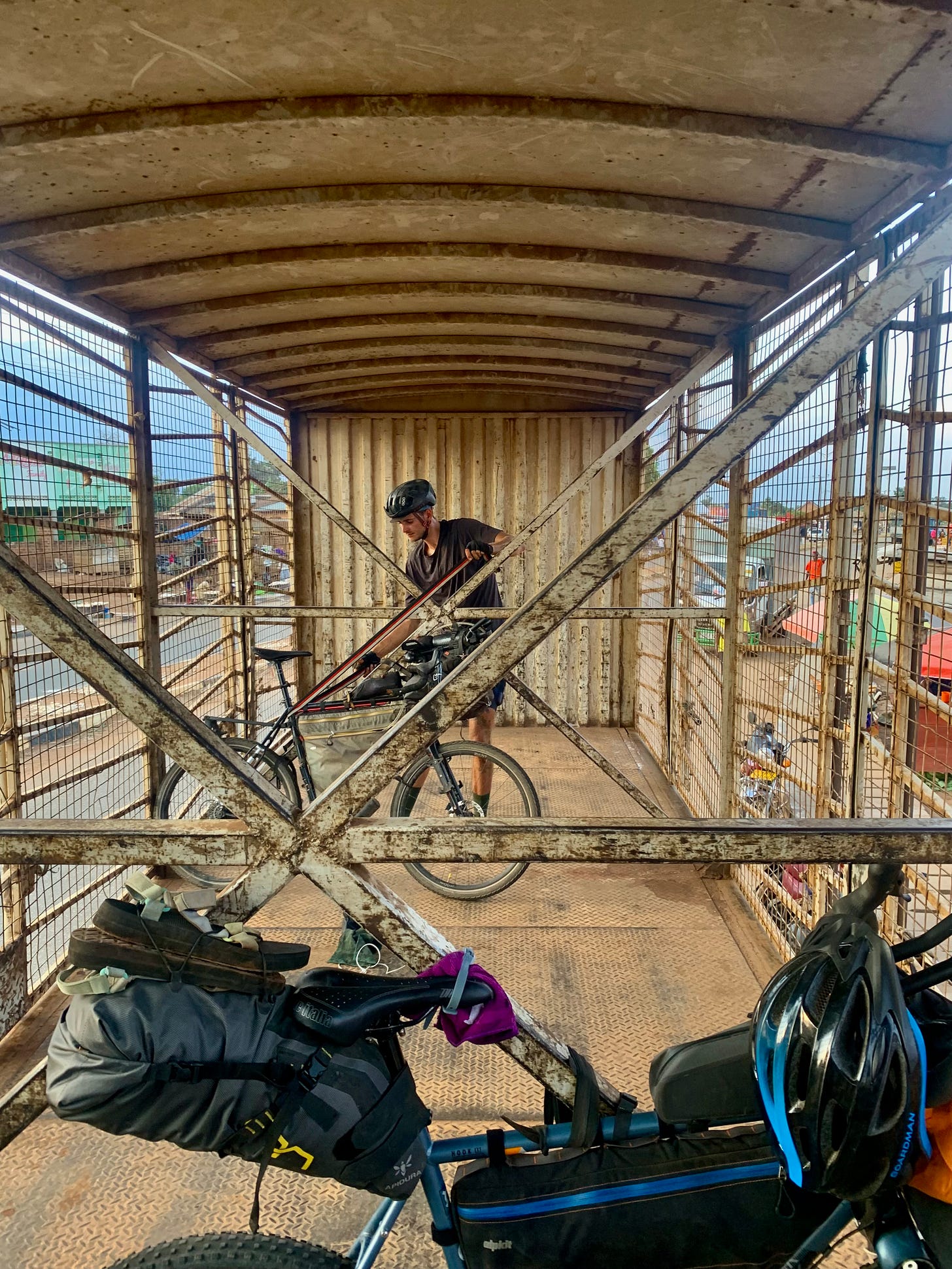
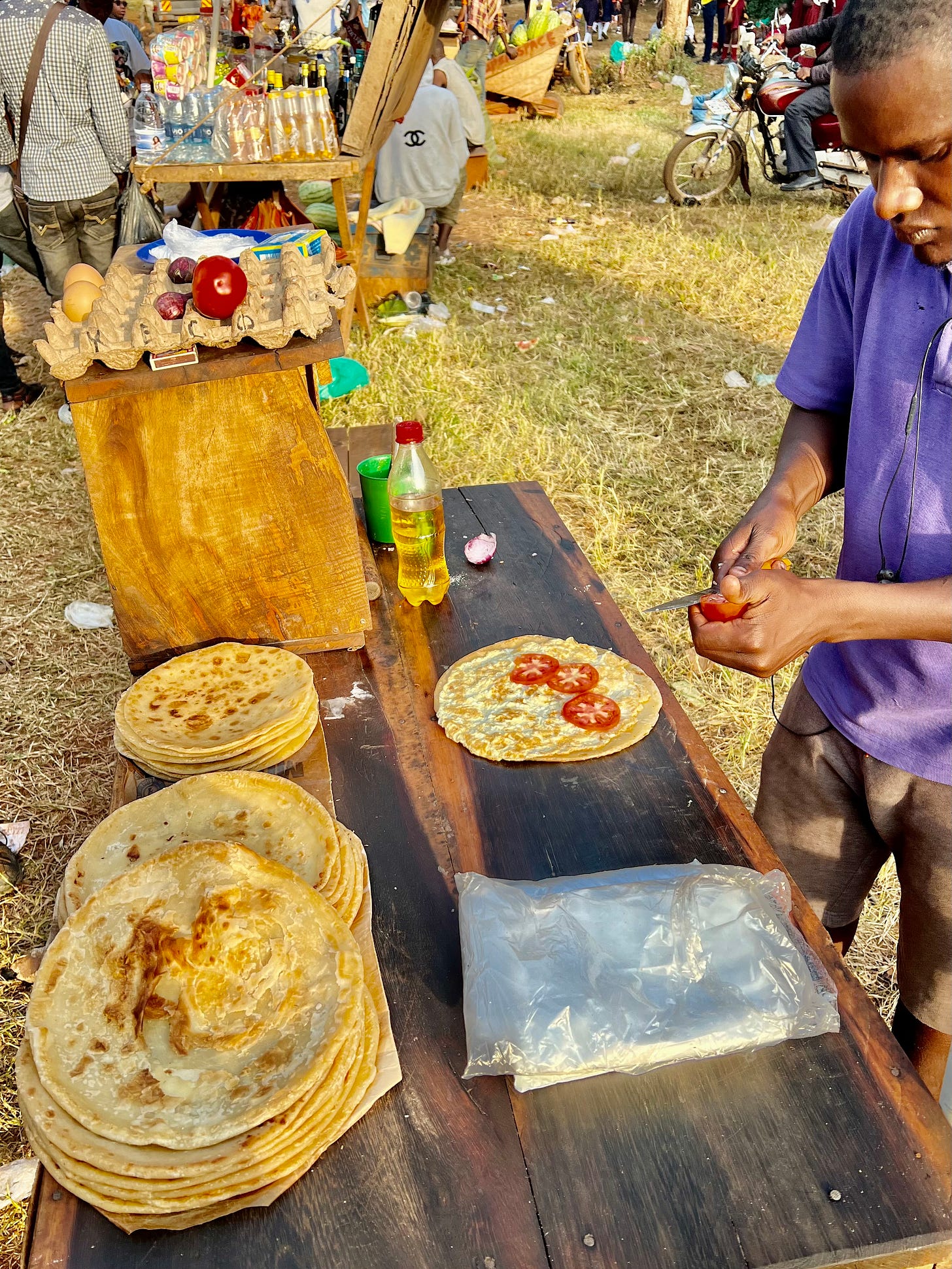
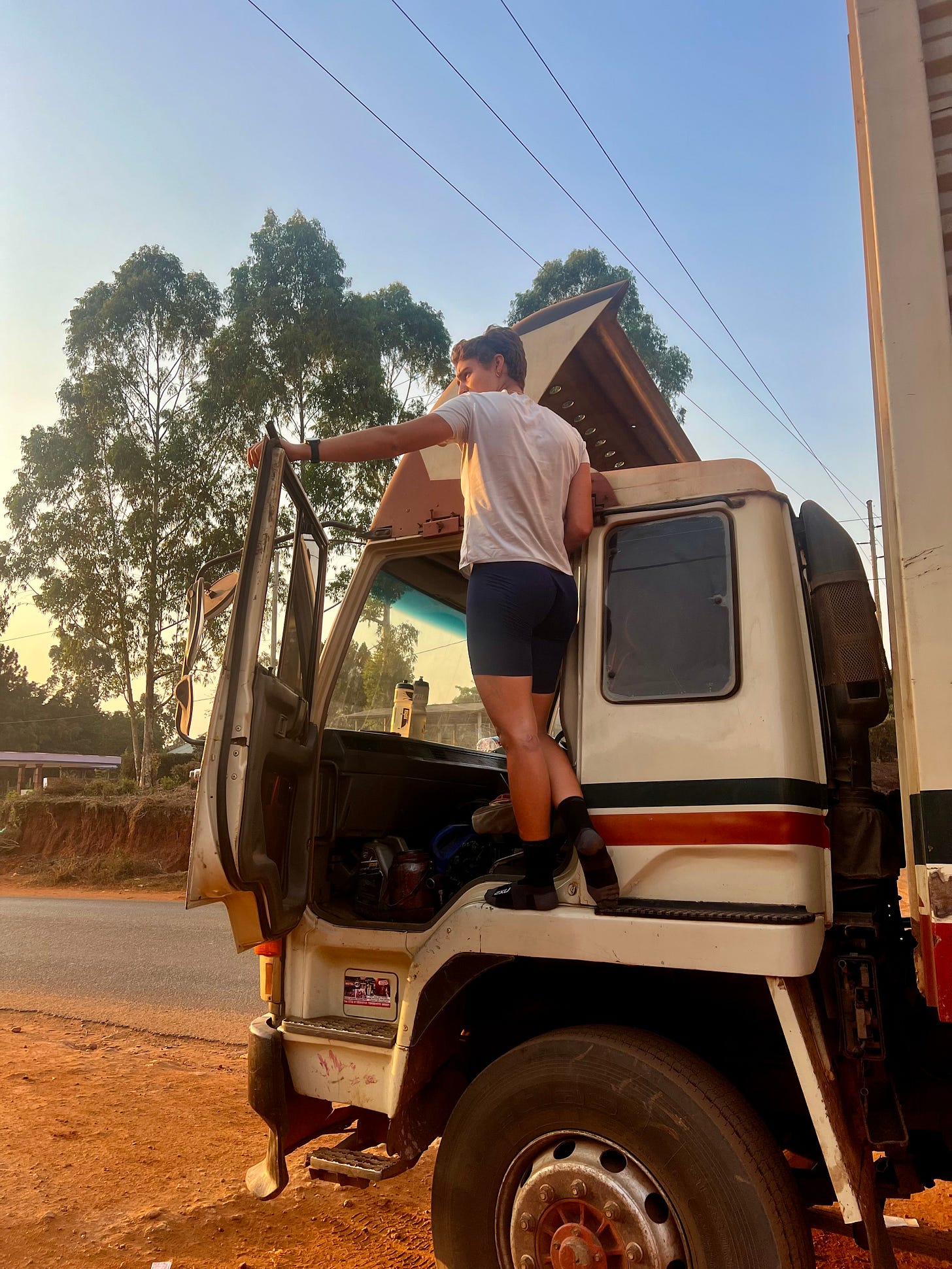
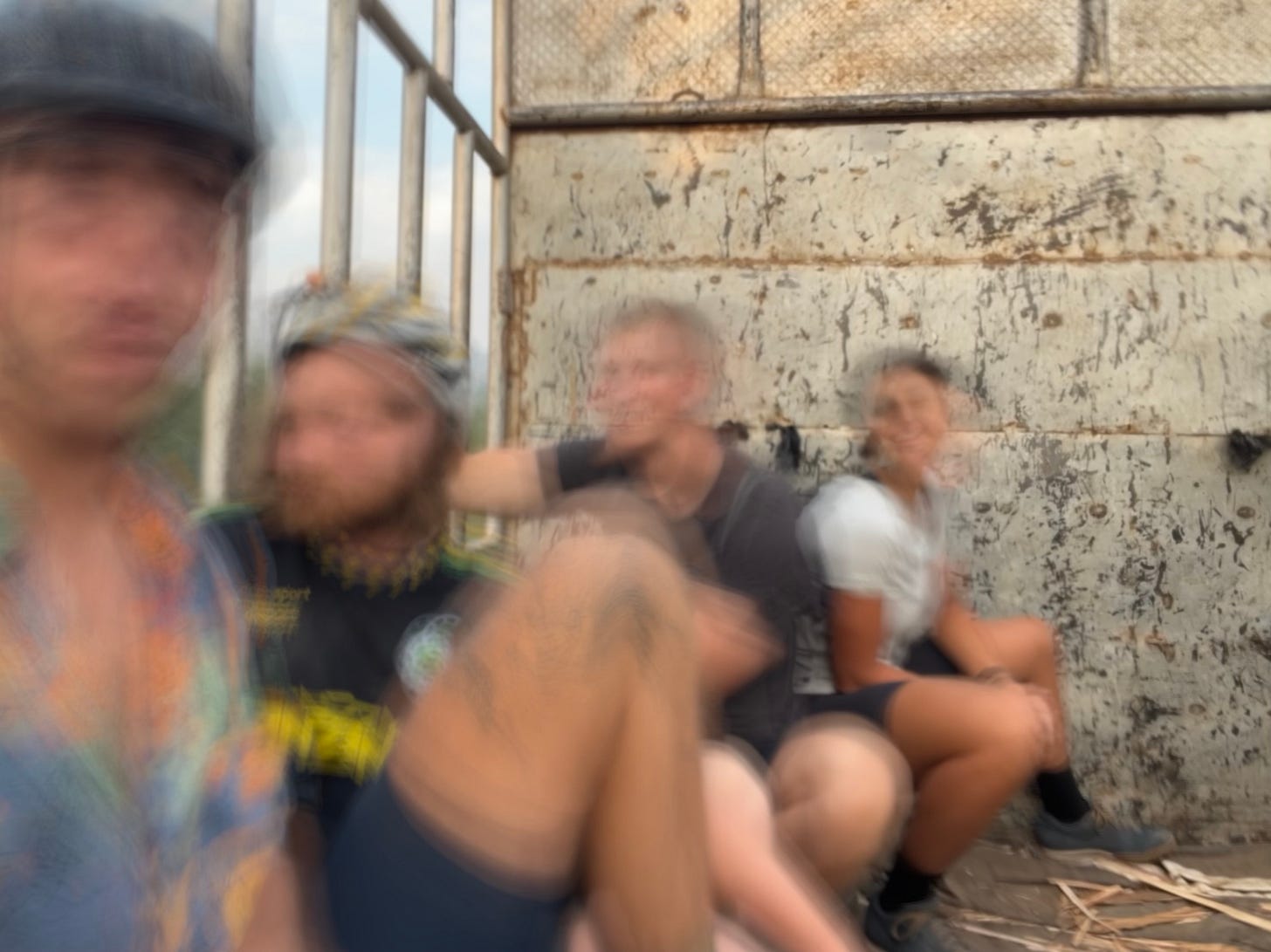
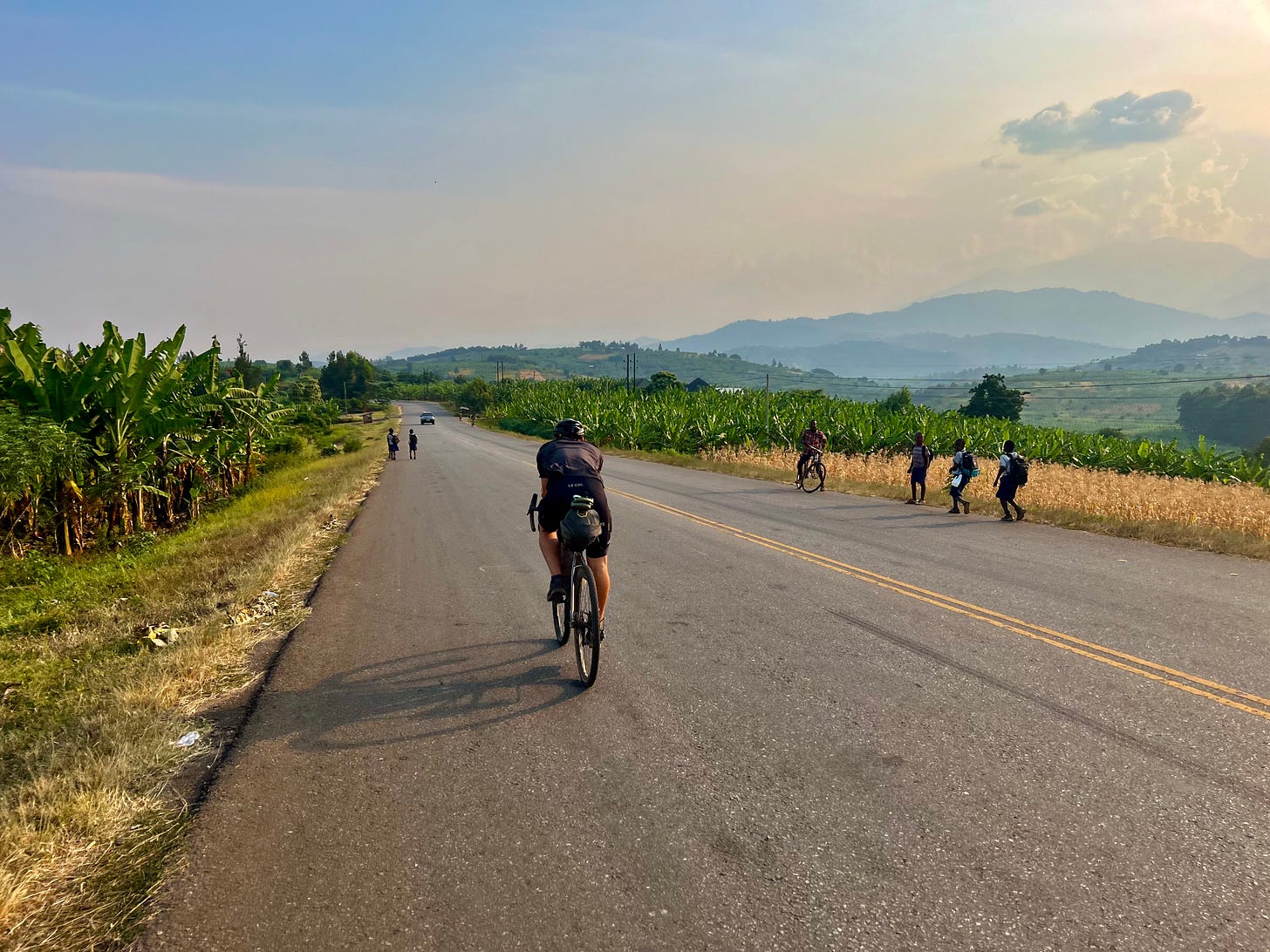
Keep on keeping on, Rosie xxxx
Christianity, it would appear, is a broad church.... Lovely stuff as always.